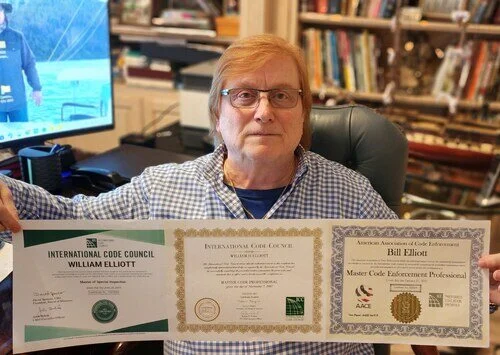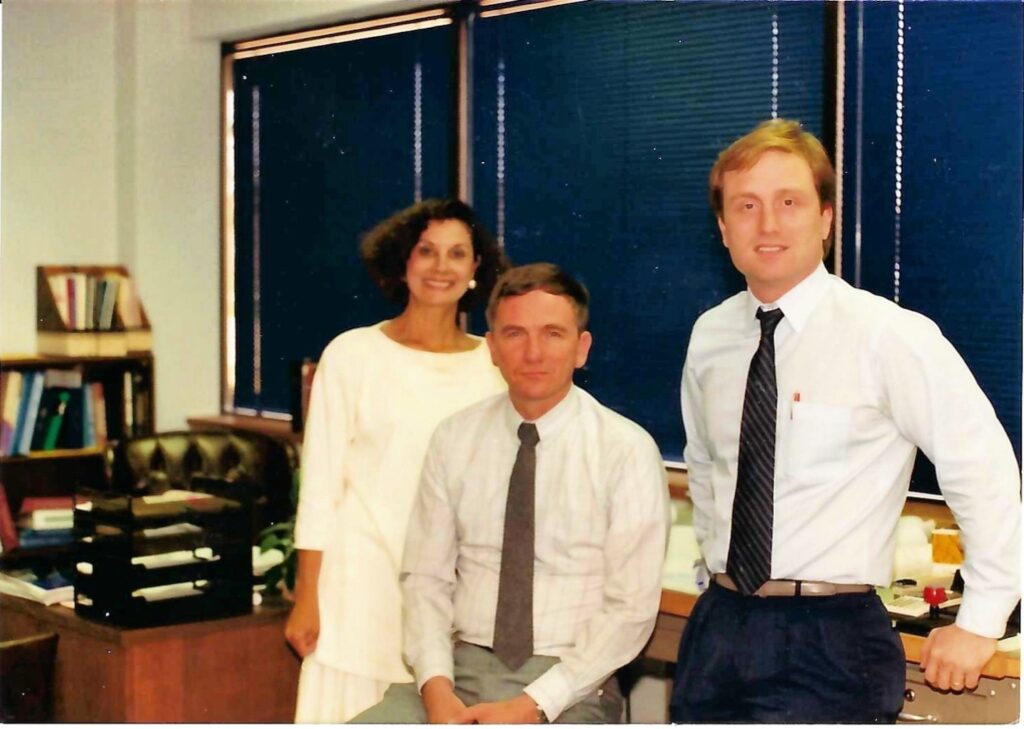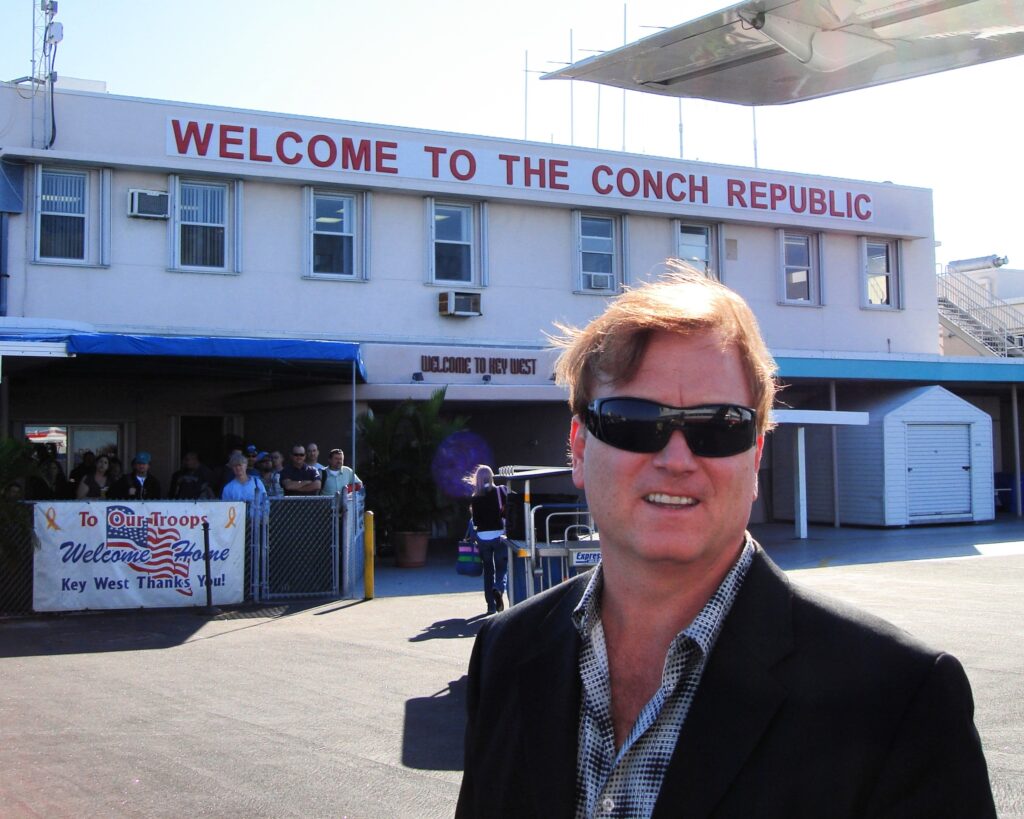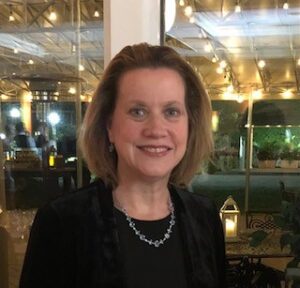
Elliott Emphasizes Value of MCP Certifications in Award-Winning Career
Elliott currently holds 62 renewable and five non-renewable Code Council certifications that took him years to earn.
Earning three master-level certifications and serving in extensive International Code Council roles were instrumental in Bill Elliott’s remarkable career as a Texas building official.
Now retired in Carrollton, Texas, Elliott had an early interest in architecture, engineering and construction, which evolved into an award-winning career that spanned the building inspection departments of diverse Texas cities.
“When I started in the building inspection profession, I was not fully convinced it was the final career path for me but more of an employment opportunity offering normal working hours where I could focus and work on my engineering degree,” said Elliott. “Little did I know back then that I would grow to really enjoy my profession in building code enforcement.”
He found many opportunities for professional growth within the building safety industry and recalled a few mentors who helped him along the way.
“I had mentors when I first started in the construction industry who taught me what I needed to know to grow in the profession,” he said. “One of my mentors gave me my first opportunity in the building inspection profession and he hired me as his Chief Plumbing and Mechanical Inspector, and I will never forget what he did for me.”

Earning MCP Certifications: Leading by Example
Elliott currently holds 62 renewable and five non-renewable Code Council certifications that took him years to earn.
He most recently earned the Code Council’s Master of Special Inspection (MSI) certification, adding to his Master Code Professional (MCP) certification and his American Association of Code Enforcement’s (AACE) Master Code Enforcement Professional (MCEP) certification, totaling three master-level professional certifications.
“As a building official, throughout my career, I have always felt the need to be a point of reference that my employees (and public) and peers could turn to for answers,” said Elliott.
He explained that not all cities utilize their building officials (e.g., staff) in the same way, and that some cities demand more from their building officials than others.
“Some cities require the building official to not only supervise the permitting inspection process but also, code enforcement, zoning enforcement, food inspections (e.g., sanitarians), building maintenance, animal control, etc.,” he said. “So, a building official may have to learn the many duties of the staff he/she supervises. A good way to achieve that is to serve as an example by pursuing the master level in each professional discipline.”
Elliott’s additional professional certifications and licenses include the National Fire Protection Association (NFPA) Certified Fire Plan Examiner (CFPE) certification, two separate LEED-AP designations and multiple state construction trade licenses.
Top MCP Tips and Lessons Learned
Elliott emphasized that building safety professionals planning to pursue MCP/MSI certification have to want it.
“First, you must personally want the MCP/MSI certification, since it requires a large commitment of your time, effort and cost,” he emphasized. “You will want to seek support from your city manager, because each Code Council professional certification represents the cost of the code books, standards, workbooks, exam costs and possible travel costs.”
“Not all cities may reimburse you in your efforts,” he continued. “Of the cities I have worked for in the past, I would estimate that they paid for half, and I paid the rest for the current certifications I have. Some cities may only reimburse one or two certifications a year and if you want to expedite the exam process you must be prepared to commit to the cost on your own.”
He said a top MCP/MSI benefit is that it represents a professional benchmark in one’s understanding of the Code Council’s International Codes®.
“I have historically had the opportunity to improve the Insurance Services Office (ISO) scores of several cities I have worked for during my career,” he said. “A big part of the ISO Building Code Effectiveness Grading Schedule (BCEGS®) score is the building official’s and department staffs’ credentials.”
Elliott recalls two examples demonstrating the value of MCP certification.
“In 2007, I worked for the City of Colleyville, Texas, and with my staff at the time we were able to greatly improve the Town’s ISO scores to a score of two in the Residential Construction category and a score of two in the Commercial Construction category,” he said. “I was informed by the ISO analysist that we had best ISO BCEGS score in the state of Texas at the time.“
The second achievement was in the Town of Addison, Texas, where he capped his career.
“We were able to improve our ISO BCEGS score to a three in the Residential Construction category and a two in the Commercial Construction category, again a very high ISO rating,” he said. “The great thing about achieving a good ISO BCEGS score, according to ISO, is that it has the potential of lowering the fire insurance costs in the community, benefitting not only homeowners but city business owners as well.”

Code Council Roles and Recommendations
As a longtime Code Council contributor in many roles, Elliott highly recommends not missing an opportunity to serve.
“I recommend Code Council members try volunteering for a code committee,” said Elliott. “I believe you will come away from the effort rewarded in professional ways you may not expect.”
His extensive involvement in the code development process spans decades.

“I have had the privilege to serve on several Code Council Code Interpretation Committees over the years, from which I have learned that there are some really smart and capable professionals who devote their time and expertise to assist in promoting our code safety industry,” said Elliott.
“More recently I had the pleasure of serving on the ICC 300 2023 Standard for Bleachers, Folding and Telescopic Seating and Grandstands®” code writing committee. The committee members met 30 times with two-hour meetings each time, approximately over one year (not counting homework) and I came away from the experience with a greater appreciation of how devoted and professional the committee members and Code Council staff were to the mission of improving the standard,” he said.








